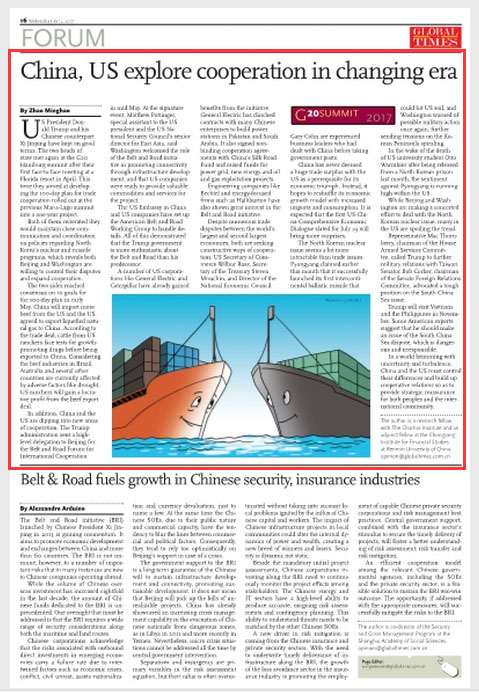Major Power Relations
Your Present Location: PROGRAMS> Major Power RelationsZhao Minghao: China, US explore cooperation in changing era
By Zhao Minghao Source: Global Times Published: 2017-7-11
US President Donald Trump and his Chinese counterpart Xi Jinping have kept on good terms. The two heads of state met again at the G20 Hamburg summit after their first face-to-face meeting at a Florida resort in April. This time they aimed at developing the 100-day plan for trade cooperation rolled out at the previous Mar-a-Lago summit into a one-year project.
Both of them reiterated they would maintain close communication and coordination on policies regarding North Korea`s nuclear and missile programs, which reveals both Beijing and Washington are willing to control their disputes and expand cooperation.

The two sides reached consensus on 10 goals for the 100-day plan in early May. China will import more beef from the US and the US agreed to export liquefied natural gas to China. According to the trade deal, cattle from US ranchers face tests for growth-promoting drugs before being exported to China. Considering the beef industries in Brazil, Australia and several other countries are currently affected by adverse factors like drought, US ranchers will gain a lucrative profit from the beef export deal.
In addition, China and the US are dipping into new areas of cooperation. The Trump administration sent a high-level delegation to Beijing for the Belt and Road Forum for International Cooperation in mid-May. At the signature event, Matthew Pottinger, special assistant to the US president and the US National Security Council`s senior director for East Asia, said Washington welcomed the role of the Belt and Road initiative in promoting connectivity through infrastructure development, and that US companies were ready to provide valuable commodities and services for the project.
The US Embassy in China and US companies have set up the American Belt and Road Working Group to handle details. All of this demonstrated that the Trump government is more enthusiastic about the Belt and Road than his predecessor.
A number of US corporations like General Electric and Caterpillar have already gained benefits from the initiative. General Electric has clinched contracts with many Chinese enterprises to build power stations in Pakistan and Saudi Arabia. It also signed non-binding cooperation agreements with China`s Silk Road Fund and raised funds for power grid, new energy and oil and gas exploitation projects.
Engineering companies like Bechtel and energy-focused firms such as Halliburton have also shown great interest in the Belt and Road initiative.
Despite numerous trade disputes between the world`s largest and second largest economies, both are seeking constructive ways of cooperation. US Secretary of Commerce Wilbur Ross, Secretary of the Treasury Steven Mnuchin, and Director of the National Economic Council Gary Cohn are experienced business leaders who had dealt with China before taking government posts.
China has never deemed a huge trade surplus with the US as a prerequisite for its economic triumph. Instead, it hopes to reshuffle its economic growth model with increased imports and consumption. It is expected that the first US-China Comprehensive Economic Dialogue slated for July 19 will bring more surprises.
The North Korean nuclear issue seems a lot more intractable than trade issues. Pyongyang claimed earlier this month that it successfully launched its first intercontinental ballistic missile that could hit US soil, and Washington warned of possible military action once again, further sending tensions on the Korean Peninsula spiraling.
In the wake of the death of US university student Otto Warmbier after being released from a North Korean prison last month, the sentiment against Pyongyang is running high within the US.
While Beijing and Washington are making a concerted effort to deal with the North Korean nuclear issue, many in the US are spoiling the trend.
Representative Mac Thornberry, chairman of the House Armed Services Committee, called Trump to further military relations with Taiwan. Senator Bob Corker, chairman of the Senate Foreign Relations Committee, advocated a tough position on the South China Sea issue.
Trump will visit Vietnam and the Philippines in November. Some American experts suggest that he should make an issue of the South China Sea dispute, which is dangerous and irresponsible.
In a world brimming with uncertainty and turbulence, China and the US must control their differences and build up cooperative relations so as to provide strategic reassurance for both peoples and the international community.
The author is a visiting fellow at the Chongyang Institute for Financial Studies at Renmin University of China.
Key Words: China; US; Trump; Zhao Minghao























































































 京公网安备 11010802037854号
京公网安备 11010802037854号





